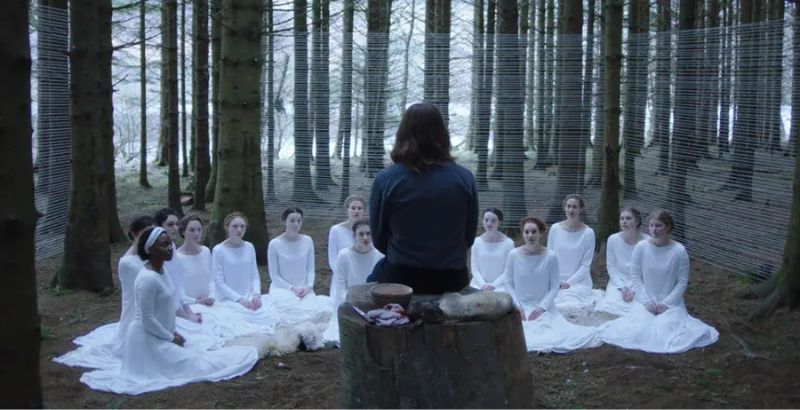
There’s something to be said for a genuinely arresting film. It’s a rare and wonderful thing for a film to utterly capture you and hold you in a trance. The Other Lamb is such a film. Unassuming and with very little pomp and circumstance, this minimalist horror does more than just capture. The Other Lamb grabs you by the throat and won’t let go.
The Other Lamb stars Raffey Cassidy (The Killing of a Sacred Deer), Michiel Huisman (The Haunting of Hill House), and Denise Gough. The film was written by C.S. McMullen and helmed by director Malgorzata Szumowska. The Other Lamb enjoyed its world premiere at the 2019 Toronto International Film Festival and was followed by appearances at Fantastic Fest 2019 and BFI London Film Festival 2019.
Teenage Selah (Raffey Cassidy) was born into a cult and this strange, isolating world is all she knows. Her existence is limited to the remote cloister of herself and a group of other young women, wives and daughters, that are led by the enigmatic Shepherd. Gradually, as Selah transitions from girlhood to a woman, cracks begin to appear in her worldview. Selah starts to question everything around her, for the first time, in this haunting fable of adolescence and rebellion.
A horror film is only as good as its monster and The Other Lamb has broken the mold with the creation of The Shepherd. While this is Selah’s story, The Shepherd (played by Michiel Huisman) is the body she orbits around. The Shepherd is equal parts seducer, father, religious authority, judge and jury. He wields power over every piece of Selah’s life. The viewer never learns where he came from, or how he came to his position as a cult leader. He’s as gentle as he is terrifying.
The Shepherd is one of the most fascinating characters to emerge out of recent cinema. Brought to life by Huisman’s amazing performance and incredible writing. When looking at a film with as grand a scope as The Other Lamb, it’s natural to want to assign a role to The Shepherd. What does he represent really?
In the opinion of this critic, The Shepherd is the embodiment of all manner of patriarchy. He represents every small way that maleness impacts womanhood, the good, the bad, and the horrific. Truly, patriarchy and very primitive notions of man and woman are a central theme of The Other Lamb. Over the course of the film and through the eyes of Selah, the viewer gets a glimpse of women’s experiences with men. At times, The Shepherd is a gentle and loving protector and educator. The Shepherd is both a man and an institution, illustrating eons of men at the helm of religion and politics. The women in The Shepherd’s “flock” adore and love him, but are often terrified by him.
In fact, it is only in a realm where man cannot go that Selah is given the context to being to question The Shepherd. In the world of the film, women are isolated from the rest of the group during menstruation. In the one place where The Shepherd has no influence, Selah is able to freely learn directly from female perspective. It is only when allowed to flourish, as a woman, she sees beyond The Shepherd.

The film uses many wonderful devices to root Selah to this idea of primitive womanhood. In many scenes, Selah stares down the solitary ram in the cult’s flock of sheep. In one instance, she approaches it on all fours putting herself on equal footing with the allegorical equal of The Shepherd. It’s very on-its-face symbolism, but powerful nonetheless. Later, Selah defies the order of The Shepherd by telling a story to her sisters. The story is of a wild woman, made of moonlight and teeth, that runs naked through the woods in complete possession of herself. These are the moments where Selah makes her stand and carves a path to freedom.
The Other Lamb is an incredibly effective horror film. It thrives in tension and creating a suffocating viewing experience. Being that this is a film with a deeply feminine core, The Other Lamb is quite comfortable with blood. Additionally, the film has a deliberately timeless quality. We understand the film is taking place in modern times, but the cult is so removed and remote that you could easily place this story at any point. This reinforces the broader patriarchal narrative and lends a sort of power to the female characters. It’s not a story about modern women, it’s a story about all women through the whole of history. These elements combined makes for an incredible stylish piece that’s genuinely creepy.
In terms of pacing and tone, the film is certainly a slow burn. There’s a sort of feverish anxiety to the unfolding narrative, punctuated by fractured awareness. As Selah begins to question the world around her, we get glimpses of frightening visions and terrifying violence. It’s hard to keep track of what’s real and the viewer awakens in real-time with Selah.
Early on in the film, we understand the looming threat of The Shepherd as a seductive predator. It’s unsettling and stomach turning. Because of this, you can’t help but hold your breath as you view The Other Lamb. The viewer spends every moment, leading up to the complex, knowing that something awful is coming and just waiting for the hammer to drop.
A harrowing and anxiety-inducing tale, bolstered by gorgeous cinematography and expert performances, The Other Lamb is utterly captivating.
The Other Lamb will be available on-demand.
The Other Lamb
-
Rating - 7/107/10
TL;DR
A harrowing and anxiety-inducing tale, bolstered by gorgeous cinematography and expert performances, The Other Lamb is utterly captivating.






